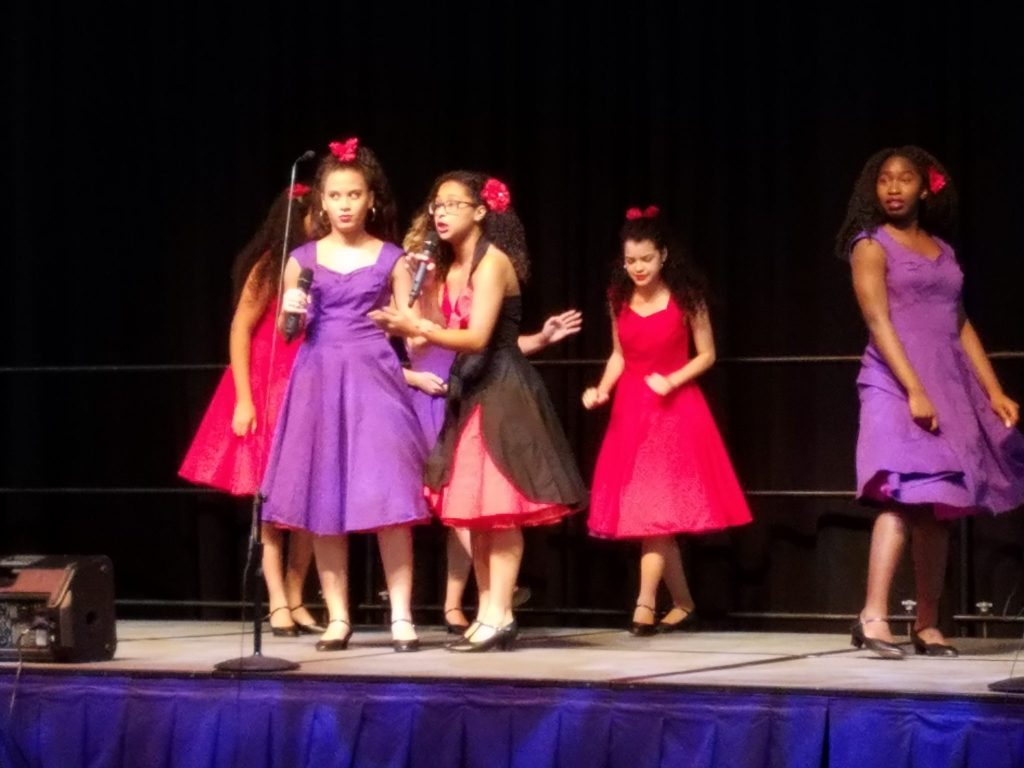Students are learning the universal language of music
by Jamie Bernstein and Anita Walker
This op-ed originally appeared in Commonwealth Magazine on Sept. 4, 2018.
This will be our reply to violence: to make music more intensely, more beautifully, more devotedly than ever before.
–Leonard Bernstein
ON A RECENT AUGUST DAY, students gathered around a piano on a stage at Lawrence High School. They were rehearsing the forthcoming production of “West Side Story,” written by a composer born just a few blocks away almost exactly a century ago.
What would Leonard Bernstein make of these students singing and dancing their way through his mid-20th Century masterpiece? Do they understand the questions he asked about cultural identity and racial conflict in urban America, and do those questions have meaning for them in 21st Century Lawrence?
Would Lenny have seen in these young people a realization of his vision for music as a unique force for creative transcendence, personal transformation, and social justice?
We think he would be delighted. And we believe he would embrace new models of music education taking hold in Lawrence and other communities across Massachusetts and the nation—models that not only transmit a lifelong love of the arts, but foster vital skills and capacities in children, especially those facing poverty, trauma, and other obstacles. The educational process is led by skilled, caring educators who see creative youth not as problems to be fixed, but as lights to be illuminated. The model calls for young people themselves to play an active role in creating art and shaping their future not only through music, but across the arts, humanities, and sciences.

More than traditional arts and music education, this work is called creative youth development. It’s an intentional, holistic practice that fosters active creative expression alongside core social, emotional, and life skills. In supportive spaces, with guidance from skilled and compassionate teachers, children and adolescents immerse themselves in creative work: composing and performing music, producing and directing films, writing and staging new dramas, making and interpreting visual art. Youth learn and create in public, private, and charter schools; cultural institutions; YMCAs; Boys & Girls Clubs; and many other settings. They achieve high levels of artistic skill and a deeper knowledge of themselves and their cultural heritage. In turn, they become empowered to make meaningful changes in their communities.
Creative youth development has proven to be a particularly powerful force in Massachusetts’ Gateway Cities, former industrial centers that have struggled to create new economic models in the 21st Century.
Lawrence was already an established gateway for immigrants when Bernstein was born there in August 1918 to Jewish-Ukrainian parents. They chased opportunity across the state, bringing their son to Boston Latin School and Harvard, laying the foundation for one of the great careers in American cultural history.
When Bernstein became music director of the New York Philharmonic, one of the most respected and coveted positions in classical music, his educational mission was to widen access to the arts to as many young people as possible via the mass medium of television. Many of today’s concert audience members will say that they got their start in loving orchestral music from watching Bernstein and the New York Philharmonic on TV as children. To this day, his Young People’s Concerts are celebrated as one of the genre’s defining moments, their vibrancy and undiluted approach resonating with those who understand the potential of young people to learn and create, when given motivation, skills, and support.
Today Lawrence stands at the vanguard of our nation’s rapidly changing demographics. Nine of every 10 students in its public schools are Hispanic. More than seven in 10 speak Spanish as their primary language, and nearly as many live in economically disadvantaged homes.
Despite those challenges, Lawrence students are learning the universal language of music in new and exciting ways. In 2014, the Lawrence schools launched their first string orchestra program based on the El Sistema model, which employs music to empower generations of youth across the globe. The schools later hired the first district-wide orchestra director.
El Sistema Lawrence was intentionally woven into the school day to leverage parental support and school resources. The program actively recruits students as they enter high school. Students perform in winter and spring school concerts, along with pop-up performances in cafeterias, hallways, and other informal settings. El Sistema Lawrence is now developing pathways for peer mentors and student leaders who will shape the social and cultural goals of their ensembles.
Creative youth development was a nascent concept when Leonard Bernstein died in 1990. But we believe he would endorse its commitment to youth agency, equity, and civic engagement. And we suspect he would be pleased to know that a child born in Lawrence in 2018 would have an even greater chance to create a life filled with music and art than he did 100 years ago.
Jamie Bernstein is an author, broadcaster, filmmaker and concert narrator who travels extensively, speaking about music as well as about her father, Leonard Bernstein. Jamie’s film documentary, “Crescendo: the Power of Music” has won numerous prizes, and is now viewable on Netflix. Her memoir, Famous Father Girl, was published by HarperCollins in June. Anita Walker is the executive director of the Mass Cultural Council, a state agency, and founding member of the Creative Youth Development National Partnership.
